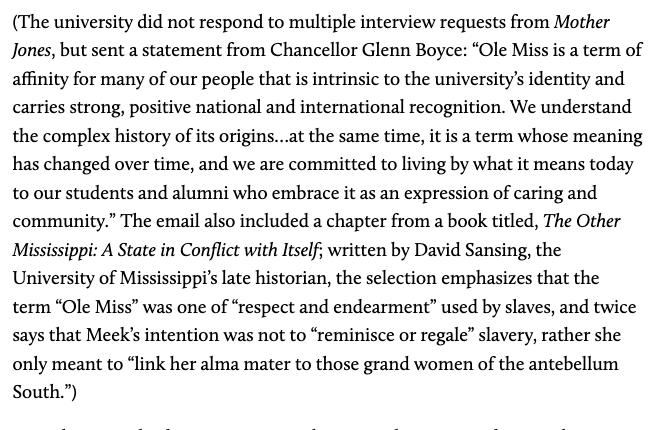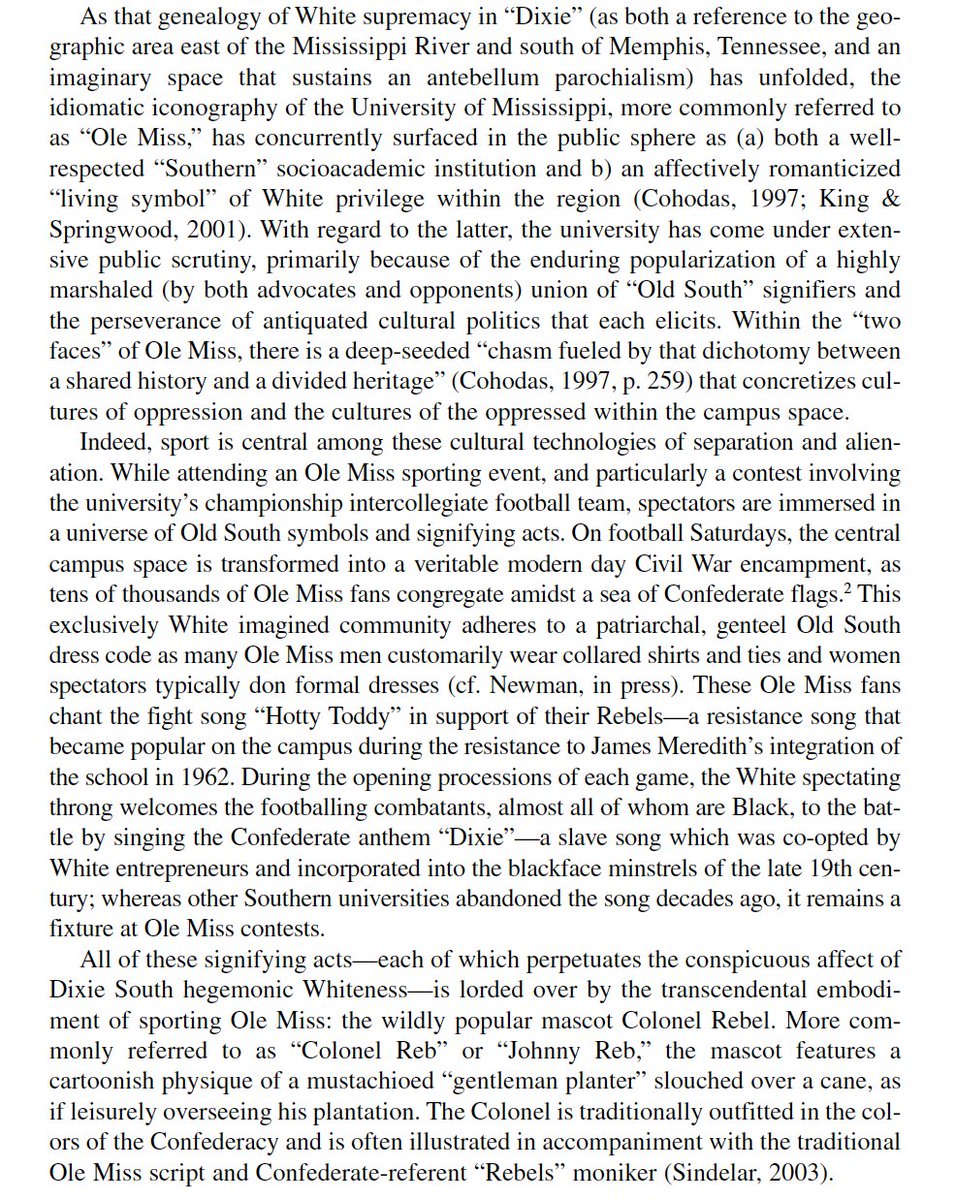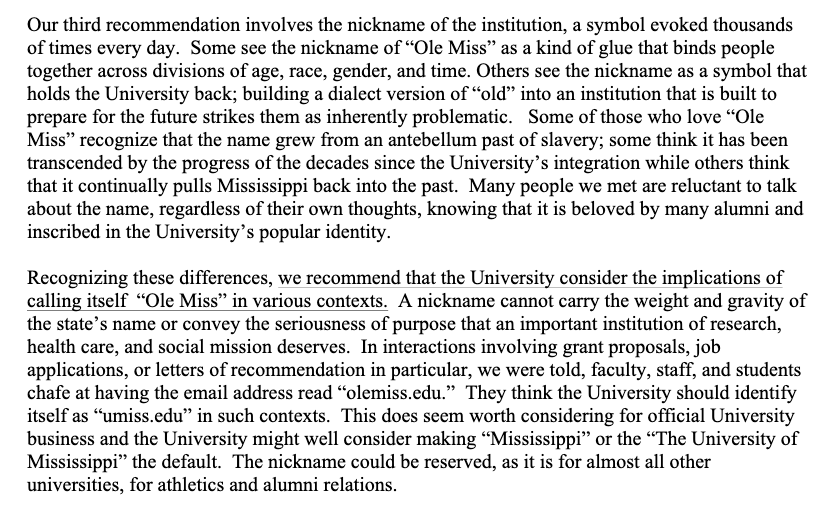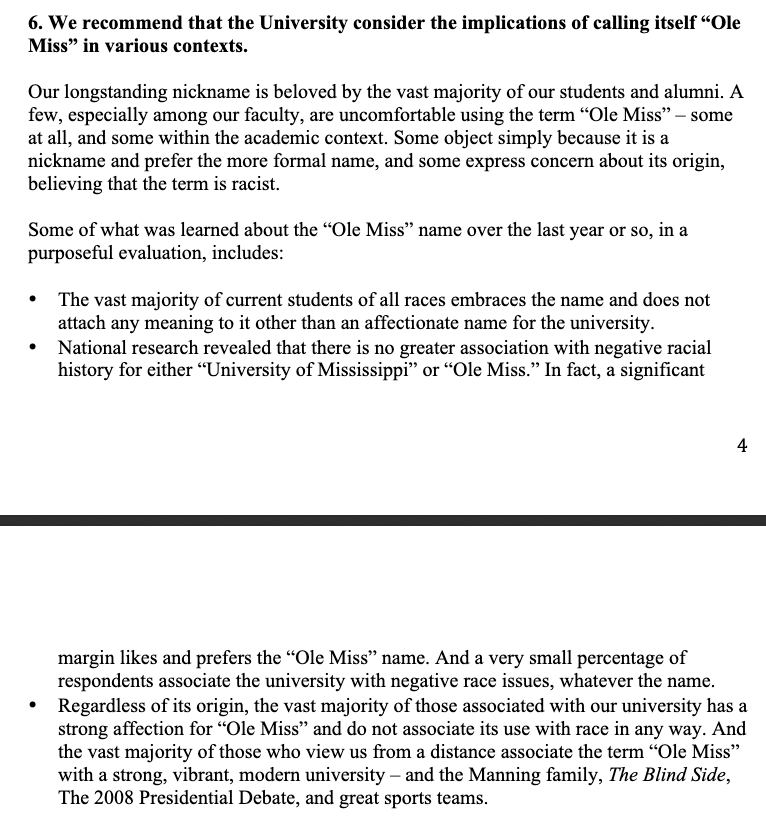Can we talk about one particular part from this exceptional piece of journalism by @kbeccaandrews?
(Thread) https://www.motherjones.com/politics/2020/07/racism-university-mississippi-nickname-ole-miss-confederate-history-elma-meeks/">https://www.motherjones.com/politics/...
(Thread) https://www.motherjones.com/politics/2020/07/racism-university-mississippi-nickname-ole-miss-confederate-history-elma-meeks/">https://www.motherjones.com/politics/...
Our Chancellor& #39;s email response to @kbeccaandrews concerning the name & #39;Ole Miss& #39; argues that (1) the name has seemingly taken on a less racist meaning, (2) people love it (!), and (3) it may not have been all that racist anyway because a former history professor said so.
All three of these points center white sympathizers& #39; perspective on the moniker, and at the expense of Black students, faculty, and staff.
To point #1:
The idea that the term, over time, is less racist works well if we can identify what sort of things the name, as a symbol, works in tandem with...
The idea that the term, over time, is less racist works well if we can identify what sort of things the name, as a symbol, works in tandem with...
So, what sort of things has the name, over time, worked in tandem with to crystallize what it means to be, or to attend, & #39;Ole Miss& #39;?
The moniker & #39;Ole Miss& #39; derives most of its symbolic force through its relationship to other & #39;Old South& #39; symbols and ideals. That& #39;s how symbolic meaning works, in a nutshell.
But don& #39;t take it from me! There& #39;s good research on this, like Professor Joshua Newman& #39;s ethnographic research featured in The Journal of Sport and Social Issues in 2007:
So at the least, the implication that the name has taken on a less racist meaning over time is dubious. Now, it could be argued that as many of the & #39;Old South& #39; symbols fall to the wayside - Dixie, the battle flag, etc - an opportunity emerges to redefine & #39;Ole Miss& #39;
But that argument fails because that& #39;s not how whiteness works. When whiteness is challenged, historically, white people don& #39;t respond by just moving on.
Historically, white people respond with rage (see Carol Anderson& #39;s excellent work). White people dig into their dominant status. And that includes digging in to the symbols that represent their dominant status. As you remove symbols, expect them to dig into the ones remaining
To point #2:
Few Black students and colleagues, when they are made aware of the origins of the school& #39;s nickname, feel good about it. They actually feel pretty awful. But don& #39;t take my word for it...
Few Black students and colleagues, when they are made aware of the origins of the school& #39;s nickname, feel good about it. They actually feel pretty awful. But don& #39;t take my word for it...
Back in 2014, following the noose placed around the statue of James Meredith, we brought in outside consultants to help us figure our shit out. Here& #39;s what they recommended:
The consultants based their recommendation, in part, on interviews with the good folks in @SouthernStudies
Nevertheless, then-Chancellor Jones didn& #39;t really embrace the recommendation, largely because, to summarize, & #39;Ole Miss& #39; polls well with...you guessed it...wealthy white folk.
To be sure, there are some Black students who do not feel one way or the other about the name, just as there are white students who are indifferent toward the name
But there are also many Black students, faculty, and staff who to this day find the name offensive, will not use it in conversation, and will not wear clothing with the name on it. Yet by centering whiteness, Boyce can avoid dealing with that messiness
Finally, to point #3:
This is the most egregious example of centering whiteness, mostly because it relies upon the trope of the & #39;happy slave& #39;, and its juxtaposition with the trope of the grandiose, antebellum Southern white woman
This is the most egregious example of centering whiteness, mostly because it relies upon the trope of the & #39;happy slave& #39;, and its juxtaposition with the trope of the grandiose, antebellum Southern white woman
There& #39;s enough in the historical record to refute this outright. The enslaved revolted, they ran away, they rebelled, and as Du Bois famously wrote in Black Reconstruction, they finally went on a general strike.
Rather than go through the entire historical record in this thread, I& #39;d rather consider this point more broadly.
To imagine the enslaved as happy on account of their enslavement is to remove all human characteristics from enslaved Black people that from Enlightenment to the present we& #39;ve imagined as inherent to the human condition - liberty, equality, freedom, etc.
The enslaved had none of those things, so how is it possible for them to be content and happy while enslaved? Only if we think of them as less than human.
But as soon as you acknowledge the humanity of the enslaved, you have to acknowledge that their & #39;natural& #39; desires are no different from anyone else& #39;s - they would desire liberty, freedom, equality, etc. Definitely NOT bondage.
"But Professor Sansing said so!" - what I imagine many Confederate sympathizers saying as they read this.
I did not know Professor Sansing when he was alive, and I will not speak ill of the dead. I will simply say this...
I did not know Professor Sansing when he was alive, and I will not speak ill of the dead. I will simply say this...
The excerpt the Chancellor recommended to @kbeccaandrews is from a book not published by an academic press, likely not peer-reviewed, and oh yeah, from a press which the University has a vested financial interest in
It& #39;s the same press that publishes The Ole Miss Experience (in its 9th edition, I believe), that all EDHE 105 students are required to purchase and read for credit.

 Read on Twitter
Read on Twitter







